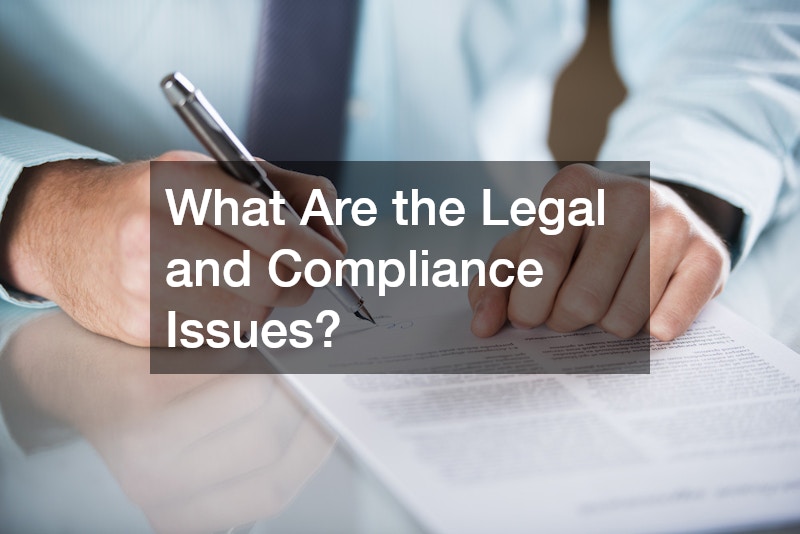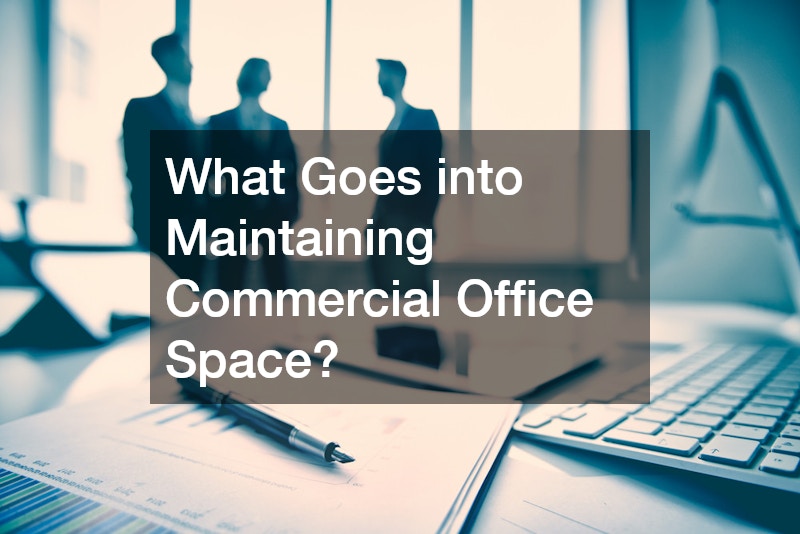Maintaining commercial office space is a multi-layered responsibility that requires careful planning, consistent execution, and attention to both aesthetic and functional details. A well-maintained office not only enhances employee satisfaction but also preserves property value and attracts tenants or clients. From routine cleaning to emergency preparedness, maintaining a commercial building involves coordination among multiple service providers and a strategic approach to long-term upkeep. Incorporating modern technology, sustainable practices, and reliable vendors ensures the space remains safe, efficient, and welcoming.
- What Is Involved in Regular Upkeep?
- How Do You Manage Building Security?
- What Are the Costs Associated with Maintenance?
- How Do You Ensure Efficient Energy Use?
- What Role Does Landscaping Play?
- How Is Waste Management Handled?
- What Are the Legal and Compliance Issues?
- How Do You Handle Tenant Relations?
- What Is the Importance of Technology in Maintenance?
- How Do You Prepare for Emergencies?
- Closing Thoughts
What Is Involved in Regular Upkeep?

Regular upkeep of a commercial office building covers everything from interior cleanliness to the operation of mechanical systems. Ignoring these foundational tasks can result in costly repairs, decreased tenant satisfaction, and operational inefficiencies.
Cleaning Responsibilities
Cleaning is the most visible form of maintenance, yet it extends far beyond simply sweeping floors or emptying trash bins. Daily cleaning routines ensure restrooms, lobbies, conference rooms, and break areas remain hygienic and inviting. Periodic deep cleaning, including carpets, upholstery, and high-touch surfaces, helps prevent the buildup of dust and bacteria. Many property managers partner with commercial cleaning companies to guarantee that cleaning standards meet health codes and industry expectations. Properly maintained flooring is also essential, as it not only affects the building’s appearance but contributes to occupant safety by reducing slips and wear over time.
HVAC System Maintenance
Maintaining heating, ventilation, and air conditioning systems is critical to occupant comfort and energy efficiency. Routine inspections by HVAC contractors ensure that systems are operating optimally, filters are changed on schedule, and ductwork remains clear. Brands like Rheem HVAC are often used in commercial installations for their reliability and energy-efficient designs. Neglecting HVAC maintenance can lead to higher utility costs, reduced air quality, and frequent system failures. Scheduled servicing and preventive care from certified HVAC contractors can extend the lifespan of the equipment and improve workplace comfort.
Electrical and Lighting Checks
Electrical systems are vital to commercial operations and require regular inspections to prevent outages or hazards. Certified electricians can ensure that wiring, outlets, and circuit breakers are up to code and functioning safely. Lighting also plays a key role in workplace productivity and energy efficiency. Replacing outdated fixtures with energy-efficient alternatives, such as LED lighting, not only reduces electricity costs but also improves the overall ambiance of the office. Routine electrical checks prevent disruptions, reduce fire risks, and support compliance with safety regulations.
Plumbing Inspections
Plumbing issues, if left unchecked, can disrupt office operations and cause extensive property damage. Regular inspections of pipes, water pressure, and fixtures can identify leaks or inefficiencies before they become costly repairs. Professional plumbers can also recommend upgrades to improve water efficiency, such as low-flow faucets or enhanced drainage systems. Maintaining plumbing is essential not only for operational continuity but also for tenant satisfaction and sanitation standards.
Exterior and Parking Lot Care
The exterior of the building, including the parking lot, shapes first impressions and affects overall safety. Commercial paving services help maintain parking areas by repairing cracks, repaving surfaces, and ensuring proper grading for drainage. Periodic pressure washing and siding maintenance keep walls, doors, and windows clean and visually appealing. Partnering with a trusted siding company ensures that building exteriors remain structurally sound and aesthetically pleasing. Landscaping, lighting, and proper surface maintenance collectively enhance curb appeal and tenant satisfaction. Construction equipment may occasionally be needed for larger exterior projects, such as repaving, drainage improvements, or exterior renovations, highlighting the importance of professional support for exterior upkeep.
How Do You Manage Building Security?
Effective security systems safeguard both people and property. Security encompasses access control, monitoring, fire safety, and on-site personnel, all of which work together to reduce risks.
Access Control Systems
Access control systems restrict building entry to authorized personnel only. Keycards, biometric scanners, and smart locks allow management to control access to sensitive areas. Periodic audits of access rights ensure outdated credentials do not compromise security. Proper access control fosters a safe working environment and limits the potential for theft or unauthorized activity.
Surveillance Cameras
Surveillance cameras serve as a deterrent to criminal activity and a tool for incident investigation. Strategic placement of cameras throughout the building, parking lot, and exterior entrances allows for continuous monitoring. Modern systems often integrate with mobile devices or cloud-based storage, providing building managers with real-time updates and historical footage.
Fire Safety Measures
Fire safety is a critical component of commercial building maintenance. Local fire protection equipment must be regularly inspected and maintained, including sprinklers, extinguishers, smoke detectors, and emergency lighting. Ensuring that all fire safety measures comply with regulations helps protect occupants and minimize property damage in emergencies. Staff training in fire response procedures further enhances safety and preparedness.
Alarm Systems
Alarm systems, both for intrusion and environmental hazards, provide an early warning that can prevent significant damage or loss. Regular testing and maintenance of alarms, including smoke, carbon monoxide, and burglar alarms, ensure they operate reliably in emergencies.
Security Personnel and Training
Trained security personnel play a vital role in maintaining a safe environment. Ongoing training, including emergency response, customer interaction, and access monitoring, ensures personnel are prepared for a range of scenarios. Combining human oversight with automated systems provides comprehensive security coverage.
What Are the Costs Associated with Maintenance?

Maintaining a commercial office building requires careful budgeting to balance regular upkeep, emergency repairs, and long-term improvements.
Budgeting for Regular Expenses
Routine maintenance involves predictable expenses, such as janitorial services, HVAC servicing, electrical inspections, plumbing checks, and landscaping. Allocating a portion of the operating budget to these tasks ensures timely completion without compromising quality.
Cost of Emergency Repairs
Unexpected issues, from plumbing leaks to roof damage, can be costly if not addressed promptly. Emergency repairs often require specialized labor, such as certified electricians, HVAC contractors, or commercial paving crews. Keeping a reserve fund for emergencies minimizes disruption to operations and protects tenant satisfaction.
Labor and Service Fees
Outsourcing maintenance to professionals ensures high-quality work but comes at a cost. Labor fees for HVAC contractors, plumbers, electricians, and commercial cleaning companies must be factored into the budget. Establishing long-term service contracts can provide predictable costs and priority response times.
Materials and Supplies Expenditure
In addition to labor, materials and supplies, including HVAC filters, lighting fixtures, plumbing parts, siding materials, flooring, doors, and roofing components like TPO roofing membranes, are necessary for proper maintenance. Planning for material costs in advance prevents delays in repairs or upgrades.
Cost-Saving Strategies
Cost-saving measures, such as preventive maintenance, energy-efficient upgrades, and bulk purchasing of supplies, reduce long-term expenses. For example, investing in TPO roofing or energy-efficient HVAC systems can lower utility costs and extend the life of infrastructure. Strategic planning allows building owners to maintain high standards while managing budgets effectively.
How Do You Ensure Efficient Energy Use?
Energy efficiency is a growing concern for commercial properties. Proper energy management reduces operational costs, enhances sustainability, and promotes occupant comfort.
Energy Audits
Energy audits identify inefficiencies in lighting, HVAC systems, insulation, and other building operations. These assessments reveal opportunities to reduce consumption and optimize performance. HVAC contractors and certified electricians often participate in audits to provide professional recommendations.
Implementing Smart Technology
Smart building technologies, such as automated lighting, climate control, and occupancy sensors, improve energy efficiency while maintaining comfort. Integration with building management systems allows for real-time monitoring and adjustments, ensuring energy is used only when needed.
Upgrading to Energy-efficient Appliances
Replacing outdated equipment with energy-efficient alternatives, such as modern Rheem HVAC units, LED lighting, and efficient appliances, can significantly reduce utility bills. Routine upgrades contribute to long-term sustainability goals while enhancing building performance.
Routine System Performance Checks
Consistent monitoring of HVAC, lighting, and plumbing systems ensures they operate efficiently. Regular checks identify inefficiencies early, preventing excessive energy consumption and reducing maintenance costs.
Employee Education and Engagement
Engaging occupants in energy-saving practices, such as turning off lights, reporting maintenance issues promptly, and conserving water, enhances the building’s energy performance. Employee involvement fosters a culture of sustainability that complements technological upgrades.
What Role Does Landscaping Play?
Landscaping is not merely aesthetic; it affects safety, environmental impact, and tenant satisfaction. Well-maintained landscaping reflects a professional image and can influence tenant retention.
Attracting and Retaining Tenants
A visually appealing exterior contributes to a welcoming environment. Mature trees, manicured lawns, and thoughtful plantings enhance curb appeal and create a positive impression for clients and tenants alike.
Seasonal Maintenance Requirements
Landscaping maintenance varies by season, requiring tasks such as snow removal, leaf collection, pruning, and fertilization. Scheduling these activities ensures year-round appeal and safety.
Water Management Practices
Efficient irrigation systems and rainwater management prevent water waste while protecting building foundations and landscaped areas. Proper drainage reduces the risk of flooding and soil erosion.
Sustainable Landscaping Solutions
Sustainable practices, including drought-tolerant plantings, composting, and low-maintenance designs, reduce environmental impact and maintenance costs. Such strategies align with broader sustainability goals for commercial properties.
Impact on Building Environment
Landscaping influences building temperature, air quality, and overall atmosphere. Trees and greenery can provide shade, reduce heat absorption, and improve air quality, contributing to a healthier and more comfortable workspace.
How Is Waste Management Handled?
Proper waste management supports environmental responsibility and operational efficiency. Effective programs minimize environmental impact while ensuring regulatory compliance.
Regular Waste Disposal Services
Scheduled waste collection prevents accumulation and maintains a clean environment. Outsourcing to professional waste management companies ensures timely and safe disposal.
Recycling Programs
Recycling programs reduce landfill contributions and promote sustainability. Clear labeling, tenant education, and convenient collection points encourage participation.
Hazardous Waste Management
Hazardous materials, including cleaning chemicals or electronic waste, require specialized disposal. Compliance with environmental regulations protects tenants, staff, and the surrounding community.
Tenant Education and Involvement
Educating tenants about recycling, waste reduction, and proper disposal fosters participation and improves program effectiveness. Engagement programs enhance the building’s reputation for environmental stewardship.
Reducing Waste Generation
Adopting sustainable practices, such as digital communication, reusable supplies, and efficient material use, reduces overall waste production and supports long-term operational efficiency.
What Are the Legal and Compliance Issues?

Commercial office maintenance must adhere to numerous legal and regulatory standards. Compliance ensures safety, protects property, and minimizes liability.
Health and Safety Regulations
Buildings must comply with OSHA and local health standards, covering fire safety, sanitation, and structural integrity. Regular inspections and staff training uphold safety standards.
Building Codes and Standards
Compliance with building codes ensures electrical, plumbing, structural, and accessibility requirements are met. Certified electricians, licensed plumbers, and licensed contractors help maintain compliance.
Environmental Compliance
Environmental regulations may govern energy efficiency, waste management, and hazardous materials. Proactive compliance prevents penalties and supports sustainability goals.
Lease Agreements and Requirements
Lease agreements often define maintenance responsibilities, specifying who handles repairs, landscaping, and safety compliance. Clear communication with tenants helps prevent disputes.
Legal Liability and Insurance
Proper maintenance reduces liability risks. Adequate insurance coverage and adherence to regulations protect building owners and tenants from potential claims.
How Do You Handle Tenant Relations?
Positive tenant relations contribute to long-term occupancy, satisfaction, and community reputation.
Communication Strategies
Regular updates, newsletters, and direct communication keep tenants informed about maintenance, renovations, or policy changes. Transparent communication fosters trust.
Handling Complaints and Feedback
Responding promptly to complaints and feedback demonstrates commitment to tenant well-being. Systems for reporting maintenance issues streamline resolution.
Lease Negotiations and Renewals
Understanding tenant needs during lease negotiations and renewal discussions ensures mutual satisfaction and strengthens relationships.
Tenant Improvement Requests
Many tenants request modifications, such as new doors, flooring, or office layout adjustments. Addressing these requests professionally enhances tenant retention and satisfaction.
Community Building and Networking
Creating a sense of community through events, shared spaces, and tenant networks contributes to a positive environment and encourages collaboration.
What Is the Importance of Technology in Maintenance?
Technology enhances efficiency, predictive capabilities, and data-driven decision-making in commercial maintenance.
Building Management Systems
Integrated building management systems allow managers to monitor HVAC, lighting, security, and other operations from a central platform, improving efficiency and responsiveness.
IoT Devices and Sensors
IoT sensors track occupancy, temperature, and equipment performance in real-time, enabling proactive maintenance and energy optimization.
Automated Reporting and Monitoring
Automated reporting systems streamline maintenance tracking, schedule adherence, and compliance documentation, reducing manual oversight.
Predictive Maintenance Tools
Predictive tools analyze equipment performance data to forecast potential failures. This reduces downtime and optimizes service schedules for HVAC, roofing, and electrical systems.
Future Technological Innovations
Emerging technologies, including AI-powered monitoring, smart lighting, and energy management systems, promise to further improve efficiency, sustainability, and tenant satisfaction.
How Do You Prepare for Emergencies?

Emergency preparedness is essential to protect occupants, limit damage, and maintain operational continuity.
Emergency Preparedness Planning
Comprehensive emergency plans outline procedures for fires, natural disasters, and other crises. Coordination with local authorities and fire protection teams ensures alignment with safety standards.
Safety Drills and Training
Regular drills familiarize tenants and staff with evacuation routes, fire response, and other emergency protocols, enhancing readiness and confidence.
Emergency Equipment and Supplies
Maintaining functional fire extinguishers, first aid kits, and emergency lighting, as well as backup generators and other essential tools, ensures rapid response when needed.
Business Continuity Strategies
Plans for data protection, temporary relocation, and critical system backups support operational continuity in the event of a disruption.
Coordination with Local Authorities
Building management often works closely with local fire, police, and emergency services to ensure swift response and compliance with safety regulations.
Closing Thoughts
Proper maintenance of commercial office space requires attention to numerous interconnected factors, from daily cleaning and system upkeep to security, landscaping, and emergency preparedness. Employing certified electricians, HVAC contractors, commercial paving services, and reliable siding companies, among others, ensures a safe, functional, and aesthetically appealing environment. Integrating technology, sustainable practices, and proactive planning creates a space that supports tenant satisfaction, operational efficiency, and long-term value. By prioritizing maintenance and leveraging expert services, building managers can foster safe, efficient, and welcoming workplaces for all occupants.

